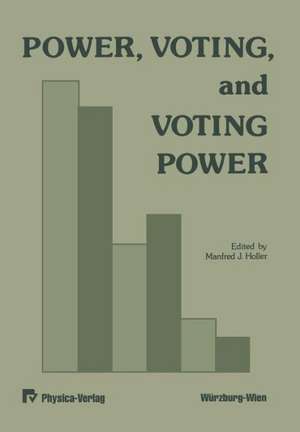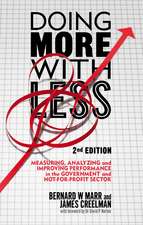Power, Voting, and Voting Power
Editat de M. J. Holleren Limba Engleză Paperback – 15 aug 2012
Preț: 393.74 lei
Nou
Puncte Express: 591
Preț estimativ în valută:
75.34€ • 80.57$ • 62.82£
75.34€ • 80.57$ • 62.82£
Carte tipărită la comandă
Livrare economică 17 aprilie-01 mai
Preluare comenzi: 021 569.72.76
Specificații
ISBN-13: 9783662004135
ISBN-10: 3662004135
Pagini: 344
Ilustrații: VI, 332 p.
Dimensiuni: 170 x 244 x 18 mm
Greutate: 0.55 kg
Ediția:Softcover reprint of the original 1st ed. 1982
Editura: Physica-Verlag HD
Colecția Physica
Locul publicării:Heidelberg, Germany
ISBN-10: 3662004135
Pagini: 344
Ilustrații: VI, 332 p.
Dimensiuni: 170 x 244 x 18 mm
Greutate: 0.55 kg
Ediția:Softcover reprint of the original 1st ed. 1982
Editura: Physica-Verlag HD
Colecția Physica
Locul publicării:Heidelberg, Germany
Public țintă
ResearchCuprins
1. Introduction.- An Introduction to the Analysis of Power, Voting, and Voting Power.- 2. The Idea of Power.- Power in Game Forms.- A Philosophical View of Power.- Power and Profit in Hierarchical Organizations.- Equivalent Concepts of Power in Voting Games.- Attribution and Social Power.- Power: An Amorphous Term — Diverse Conceptual Approaches.- 3. Formal Analysis of Representation and Voting Procedures.- Proportional Representation and Effective Number of Parties in Finland.- The Relationship Between Voting and Party Strength in an Electoral System.- Manipulation of the Agenda by Strategic Voting: Separable and Nonseparable Preferences.- Order-of-Voting Effects.- Strategic Voting in Multicandidate Elections under Uncertainty and under Risk.- Electoral Rules and Rational Voting: The Effects of Candidate Viability Perceptions on Voting Decisions.- 4. Concepts of Power Measurement.- The Problem of the Right Distribution of Voting Power.- An Axiomated Family of Power Indices for Simple n-Person Games.- Measuring Power in Voting Bodies: Linear Constraints, Spatial Analysis, and a Computer Program.- Modification of the Banzhaf-Coleman Index for Games with A Priori Unions.- Power and Satisfaction in an Ideologically Divided Voting Body.- Power in an Ideological Space.- Measuring Power.- 5. The Empirical Approach.- Party Power and Government Formation: A Case Study.- The Distribution of Power in Specific Decision-Making Bodies.- Political Geography and Political Power.- Regional Power Allocation: The Problem of British Devolution.- The Paradox of Redistribution: Some Theoretical and Empirical Results.


















